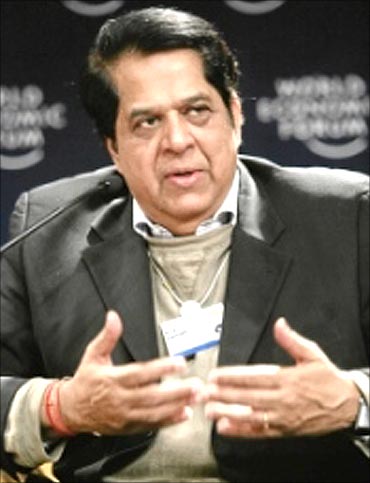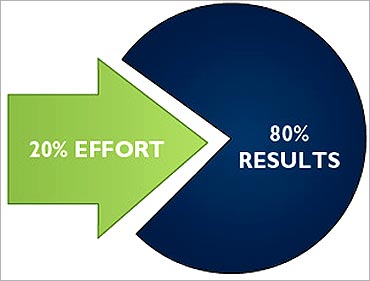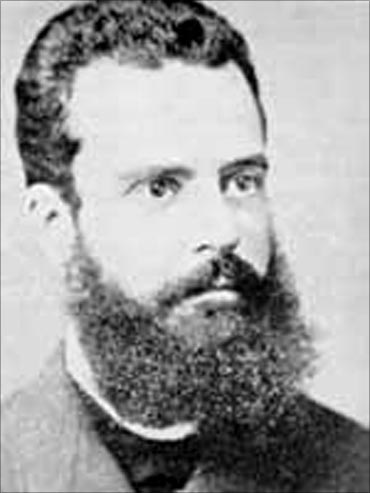K V Kamath's mantra for great success
Last updated on: October 1, 2010 12:17 IST
Image: ICICI Bank chairman K V Kamath.
ICICI Bank chairman K V Kamath has a simple mantra to increase efficiency. He has always followed the 80:20 rule: Prioritise the vital few against trivial many. Kamath started following this rule when he was a student at the Indian Institute of Management, Ahmedabad.
The Written Analysis and Communication course, a case study-based analysis, was an integral part of the MBA syllabus.
While other students would slog through the night to submit the assignment, Kamath used to submit his papers much before the deadline. That's because he was open to trading off an A for an A+ since he could use the time for more critical things.
...

Image: Pareto Principle.
That's the Pareto Principle at work for one of the most successful managers in India Inc. The principle suggests you focus on the 20 per cent that produces 80 per cent of your results. When the fire drills of the day begin to sap your time, spare a minute to figure out your priorities.
Too many managers are constantly busy doing work that can be done by their juniors, can wait or can be outsourced. In trying to focus equal attention on micro-details of every project, many managers do work that is not commensurate with their designation or salaries. They are, in effect, becoming clerks; worse, they don't allow others in the organisation to think.

Image: Pareto principle for success.
Also, while trying to centralise decision making even for day-to-day work, CEOs often forget that such management style only overloads their star performers with extra work.
Here again, the Pareto principle is at work. In any population that contributes to a common effect, a relative few of the contributors - the vital few - account for bulk of the effect. If these vital few are demoralised for a lack of empowerment, no workaholic CEO can salvage things.
The most important use of the 80:20 rule is that it defines the core of your job: work that causes problems for the company or the customer if it is not done. Applying the rule helps you know what to let slide when you don't have the time to do it all.

Image: Vilfredo Pareto.
The 80:20 rule is being applied by some companies to reduce workload. The principle here is that if 80 per cent of products and work are not that crucial, it's not a bad idea to rationalise them and/or even outsource them.
The Pareto Principle is named after an Italian economist Vilfredo Pareto who observed that 80 per cent of the land in Italy was owned by 20 per cent of the population. Pareto went on to comment that 20 per cent of his garden's pea plants produced 80 per cent of the peas he grew.

Image: Joseph Juran.
Researching further, Pareto found that in just about any event, roughly 80 per cent of the effects come from just 20 per cent of the causes. Although this ratio is not constant and the proportions may vary, the pattern is broadly followed in almost every activity in which small efforts generate non-scalar returns.
Pareto died much before his principle was widely adopted. That credit goes to people like Joseph Juran who refined Pareto's work to make it usable and popular.

Image: Making superstars.
Many companies also use this principle for their compensation packages by introducing a pay-for-performance model. Employers are increasingly finding that the 80:20 rule really applies to their staff - with 20 per cent of them generating 80 per cent of the profits - and these people should be adequately rewarded.
But experts say the Pareto principle should be thought through before it is implemented, because overdoing it may create problems.
Some companies have taken the Pareto Principle to extremes by focusing on only the "superstars", forgetting that helping the good become better is also a managerial responsibility, since no company can survive with superstars alone.

Image: FMCG cos have learnt the success mantra.
Beyond HR, fast-moving consumer goods companies learnt this the lesson hard way when they launched "power brands" to devote 80 per cent of their efforts on a few key brands that deliver the maximum profits.
Though this worked wonderfully for some time, things changed when the slowdown hit and market dynamics changed. Smaller competitors, which were more nimble-footed and worked with lower overheads, took away share in key regional markets.

Image: Hamam soap.
Result: companies like Hindustan Unilever had to redraw strategy and fall back on the hitherto neglected brands like Hamam to regain their market share in regional markets. Today, these brands are being feted by the company as jewels in its crown.
Similarly, by blindly focusing on the most profitable customers, companies can often invite a crisis. Don't forget that this segment of customers is also coveted by the competition. By spending too much time and money on them, companies may find themselves vulnerable if some customers switch loyalties suddenly.
Source:








